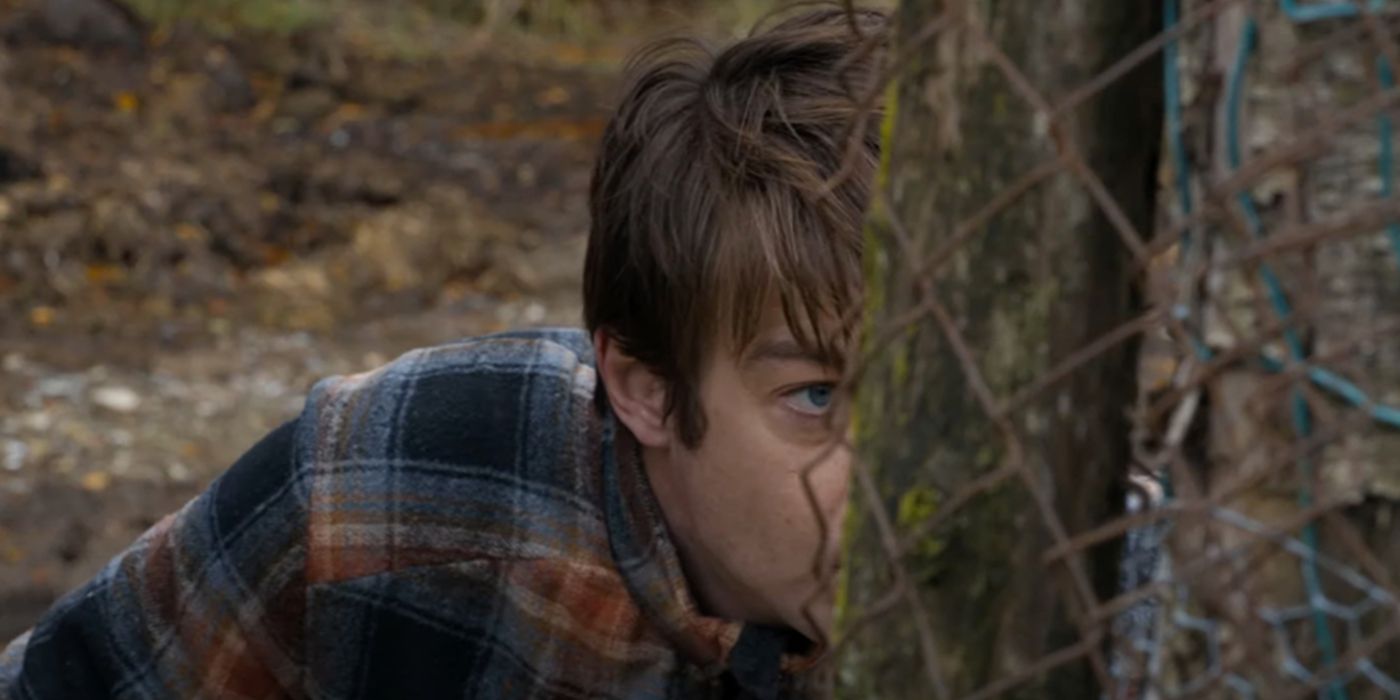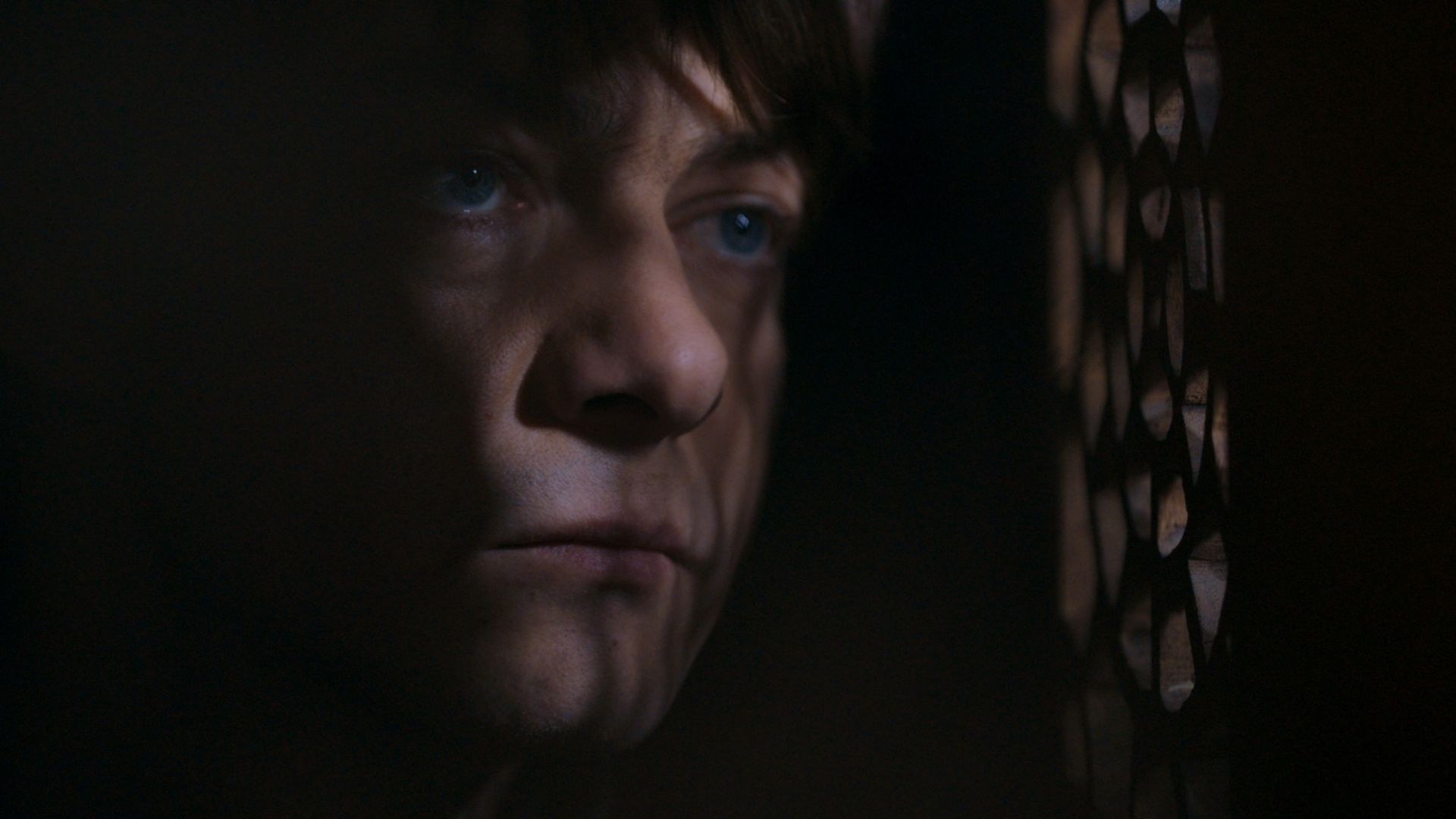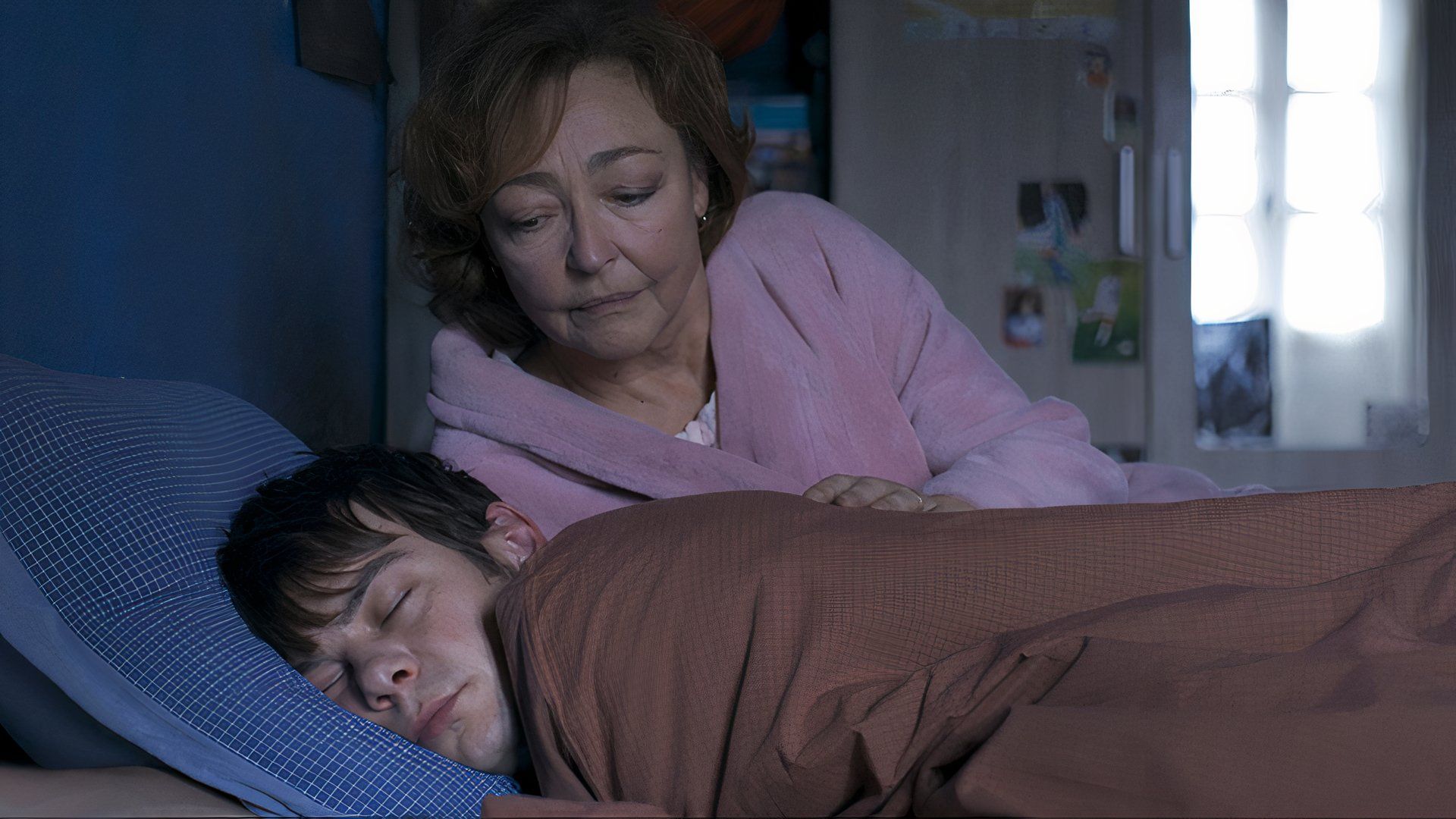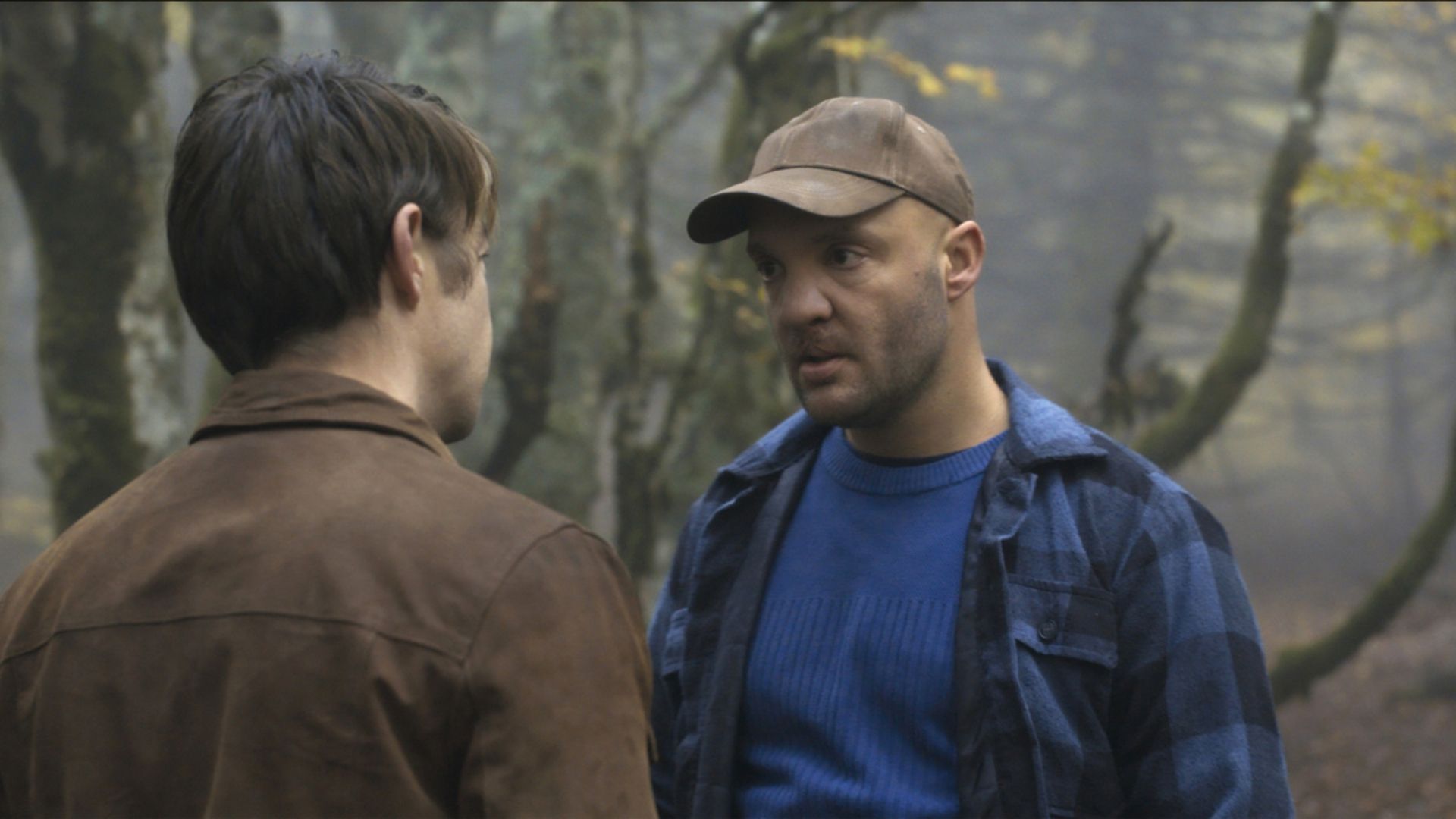
A tranquil, lengthy country road cuts through the French landscape, accompanied only by Marc Verdaguer’s subtly ominous music. The journey along this road mirrors the progression of a thought, starting innocently but gradually evolving into something complex, ominous, and challenging to define. In this manner, the movie titled Misericordia starts – much like an unexpected recollection.
Alain Guiraudie’s film, “Misericordia,” explores more than just a physical return, it delves into revisiting buried emotions, lingering conflicts, and actions performed under the guise of kindness. Similar to his previous works such as “Stranger by the Lake” and “Nobody’s Hero,”, Guiraudie once again weaves tales that are disturbingly captivating, stories that blend sexuality, morality, and tone in a unique way. These films are marked by their provocative nature, ethical ambiguity, and the seamless interplay of eroticism and violence. In the case of “Misericordia“, it’s a chilling pastoral thriller where the lines between intimacy and transgression often blur.
Murder First as Mystery, Then as Farce
In the tranquil, autumnal countryside of Saint-Martial, Occitanie, the film “Misericordia” is not so much a whodunit as it is a gradual unfolding of a moral tale, exploring themes of desire, guilt, and complicity. The character of Jérémie (portrayed by fresh talent Félix Kysyl) comes back to his roots for the funeral of his late boss, Jean-Pierre, whose influence continues in the bakery and in Jérémie’s nostalgic yearnings. He resides with Martine (the luminous and weary Catherine Frot), the widow, and her adult son Vincent (Jean-Baptiste Durand), a man brimming with festering resentment and volatile masculinity.
Initially, Jeremie’s arrival appears innocent, a sign of respect or incomplete mourning. However, Guiraudie subtly unveils that Jeremie is not merely visiting; he’s making himself at home, or as you might say, settling in. The deeper he integrates into Martine’s grief and the village’s daily life, the more uneasy Vincent grows.
In the drama of Misericordia, the strife between Vincent and Jérémie unfurls much like a household comedy heightened to the level of a suspenseful movie. What was meant to be a simple game of Yahtzee escalates into a heated altercation. A brief, seemingly innocent kiss, typical of French customs, lasts longer than expected, suggesting an unspoken past between them. Vincent consistently wears blue and maintains an air of unease, as if he’s aware that he’s part of someone else’s narrative.
Desire Without Center, Violence Without Warning



Guiraudie’s talent is evident in his avoidance of categorizing genres. While sexuality and violence are elements present, they are not explicitly stated. The fight between Jérémie and Vincent, when it occurs, seems both predictable and surprisingly ordinary. The camera neither dramatizes nor judges; instead, it passively records, implying, “Such events occur.
Following Vincent’s demise, Jeremie performs the burial rites and returns to the village with his usual gentle demeanor and courteous disposition. However, the town seems changed now, as a sense of guilt creeps in like fog. The only individual who harbors suspicions (and perhaps knows all) is the village priest. Jacques Develay portrays this character with an unsettling charm, his cheerfulness borderline eerie. It’s ambiguous whether he proposes an alibi to Jeremie as a trade for affection or for the body or the soul, or if in Guiraudie’s world, there’s no distinction between the two.
In Misericordia, the small-town atmosphere is simultaneously suffocatingly tight-knit and amusingly absurd. There comes a time when two inept police officers conduct interrogations with a ludicrous pace reminiscent of a Marx Brothers sketch. Guiraudie deliberately employs this farce, creating a sense of disorientation by abruptly switching tones. Is it a drama, satire, or parable? Indeed, it is all these things and yet none at the same time.
The movie’s underlying spiritual theme is most profoundly expressed through the character of the priest, who subtly ponders the impending downfall of society and the hollowness of future graveyards. Whether he’s mad, wise, or a combination of both remains unclear. Simultaneously, he can offer blessings and conceal wrongdoings. This internal conflict, the film implies, encapsulates the essence of faith – and love.
A Landscape of Murky Morality
Claire Mathon’s cinematography is unyielding, reminiscent of painting but devoid of romantic undertones. She positions characters from afar, allowing the environment to engulf them instead. Jerémie and Martine frequently merge with the earthy color scheme of their environments, save for Martine’s striking red sweater which stands out vividly in each shot, accentuating her eyes with a warm caramel hue. The red, serving as a vibrant contrast to Vincent’s cool blues, emerges as a recurring visual theme, symbolizing warmth, openness, and emotional intensity against his cold, oppressive energy. The persistent blue tones associated with Vincent suggest resistance, disruption, embodying the tension he struggles to suppress.
In a somewhat unexpected manner, Jeremie seems to exhibit a strange blend of gentleness and discomfort as he adapts to his fresh start. He dons the sleeping attire of the deceased. He shares a bed with Martine, who advises him that it’s premature for affectionate closeness. Nevertheless, they intertwine their hands. The mourning process has erased all barriers. This scene carries an odd mix of tenderness and unease, mirroring the film’s disquieting emotional tone.
Unlike many movies that deliberately emphasize their queerness, the film “Misericordia” effortlessly embodies it. It challenges genre conventions by presenting eroticism as a subtle, ambient potential instead of a central plot device. The specifics of Jeremie’s relationships with Jean-Pierre, Vincent, and Walter, or his brief seduction of Walter while wearing his shirt, are not explicitly defined. These scenes are not about establishing an identity arc (the film might seem vague due to its elusive characters); instead, they depict moments of desire, power, and longing. In this aspect, “Misericordia” shares thematic similarities with films like Albert Serra’s “Pacifiction“, where the action serves as subtext, and desire flows like a mist.
‘Misericordia’ Is a Pastoral Noir of the Flesh and Soul



In Guiraudie’s portrayal, it appears that justice takes a back seat to the human capacity for acceptance of certain circumstances. The townsfolk, including Martine, the police, and Walter, all doubt Jérémie’s innocence, yet they persist in their collective pretense, possibly because acknowledging the truth would require confrontation and upheaval. By the time Jérémie returns to the bakery, resuming his duties and fitting seamlessly into his former role, it’s not a victory. Instead, it’s a chilling revelation of a man living out a dream that was born from murder, supported by religion, and draped in a comforting blanket of nostalgia.
The movie titled “Misericordia” was first screened in the Cannes Premiere section during the 77th Cannes Film Festival. It contested for the Queer Palm award there, and later won the esteemed Louis Delluc Prize for Best Film in 2024, thereby establishing itself as one of the most acclaimed French films of that year by critics.
At the 28th Fantasia International Film Festival, Alain Guiraudie received the Directors Guild of Canada Award for his exceptional direction in a Canadian film, and the movie earned eight nominations at the 50th César Awards. However, it failed to win any César Awards. Nevertheless, its widespread presence at major international festivals and juried categories attests to its stylistic ambition and cultural significance.
In the film Misericordia, as the priest explains, death is more like an opening or transition rather than an end. This door leads to various experiences such as inheritance, closeness, impersonation, and something akin to love, yet not quite it. Director Alain Guiraudie invites us to contemplate Jérémie’s actions, suggesting they might make sense in the right circumstances – which may be the most thought-provoking aspect of the movie.
Misericordia, distributed by Sideshow and Janus Films, is now playing in cinemas across the country; find showtimes and purchase tickets here. The film is currently screening at Film at Lincoln Center in New York, with a Q&A with the director taking place tonight, March 21st. To delve deeper into Alain Guiraudie’s work, check out the retrospective of his films streaming on The Criterion Collection here.
Read More
- Gold Rate Forecast
- Silver Rate Forecast
- Honor of Kings returns for the 2025 Esports World Cup with a whopping $3 million prize pool
- PUBG Mobile heads back to Riyadh for EWC 2025
- USD CNY PREDICTION
- Kanye “Ye” West Struggles Through Chaotic, Rain-Soaked Shanghai Concert
- Arknights celebrates fifth anniversary in style with new limited-time event
- Hero Tale best builds – One for melee, one for ranged characters
- Grimguard Tactics tier list – Ranking the main classes
- Every Upcoming Zac Efron Movie And TV Show
2025-03-21 22:33